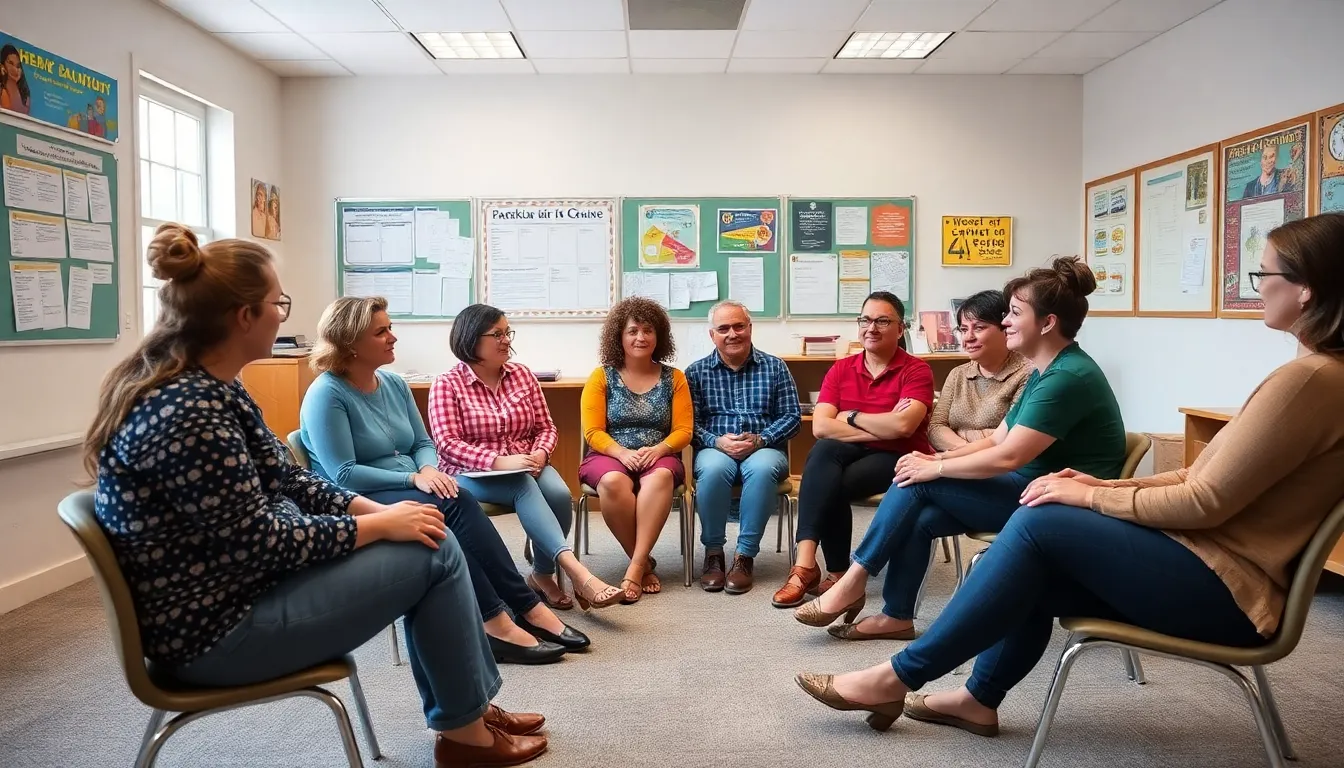Table of Contents
ToggleFoster parent training might sound like a crash course in babysitting, but it’s so much more than that. It’s the ultimate guide to transforming everyday superheroes into champions for children in need. With the right training, anyone can learn to navigate the wild world of foster care, complete with emotional rollercoasters and unexpected plot twists.
Imagine being equipped with the skills to handle everything from tantrums to teenage eye rolls. This training isn’t just about rules and regulations; it’s about building connections and creating a safe haven for kids who need it most. So buckle up and get ready to dive into a journey that’s as rewarding as it is challenging. After all, who wouldn’t want to add “foster parent extraordinaire” to their resume?
Importance Of Foster Parent Training
Foster parent training plays a vital role in preparing individuals for the challenges of caring for children in foster care. This training encompasses skills and knowledge that significantly impact both children and foster parents.
Benefits For Children
Children benefit greatly from well-trained foster parents. They receive consistent care that meets their emotional and developmental needs. Trained foster parents can recognize signs of trauma and respond appropriately, fostering a sense of safety and stability. They often create an environment that allows for healthy attachment and personal growth. Supportive care contributes to improved academic performance and behavioral outcomes, enhancing overall well-being.
Benefits For Foster Parents
Foster parents also experience several advantages through training. Equipped with skills, they feel more confident in addressing children’s unique needs. Training facilitates better communication, allowing positive relationships to flourish within the family. Continuous support from training sessions helps parents navigate challenges, reducing feelings of isolation. Engaging with a community of fellow foster parents provides shared experiences and invaluable resources, enhancing overall parenting effectiveness.
Types Of Foster Parent Training Programs

Foster parent training programs vary in focus and format. Each program serves to equip foster parents with necessary skills and knowledge.
Pre-Service Training
Pre-service training prepares individuals for the responsibilities of fostering. Most states require completion of this training before placement. It covers essential topics such as child development, trauma-informed care, and effective discipline strategies. Participants gain insights into fostering dynamics and learn the importance of cultural competency. Emphasis during this training lies on recognizing signs of trauma and understanding the effects of abuse. This foundational training builds confidence in new foster parents as they embark on their journey.
Ongoing Training Opportunities
Ongoing training opportunities provide continual support and learning for foster parents. These programs focus on enhancing skills and addressing emerging challenges. Workshops often explore topics like managing childhood behavioral issues and the impact of grief and loss on children. Online courses enable flexibility, allowing foster parents to learn at their own pace. Networking events facilitate connections with experienced foster families and professionals. Engaging in ongoing training fosters a sense of community and reinforces effective parenting practices throughout the fostering experience.
Training Content And Curriculum
Foster parent training encompasses various essential topics that prepare individuals for the rewarding responsibility of caring for children in foster care. Each training program targets specific areas to ensure foster parents are well-equipped for their roles.
Key Topics Covered
Key areas of focus include child development, trauma-informed care, and effective discipline strategies. Child development principles provide insights into the emotional and physical growth stages children undergo. Understanding trauma-informed care enables foster parents to recognize and respond to the effects of trauma on children. Discipline strategies encourage positive behavior management, fostering a safe and nurturing environment. These foundational topics enhance foster parent capabilities, leading to better outcomes for children.
Skills Development
Skills development forms a crucial part of foster parent training. Communication skills improve interactions within the family unit, benefiting both parents and children. Conflict resolution techniques help manage familial disagreements constructively. Emotional regulation skills empower foster parents to handle challenging situations calmly. Additionally, participants learn about teamwork dynamics, ensuring effective collaboration with social workers and support organizations. Each skill cultivated during training promotes a supportive and healthy atmosphere for children in foster care.
Challenges In Foster Parent Training
Foster parent training presents several challenges. Navigating these obstacles is crucial for ensuring success in foster care.
Common Obstacles
Time constraints often pose significant hurdles for prospective foster parents. Balancing training commitments with personal and work responsibilities can create stress. Emotional challenges also emerge. Adjusting to the complex needs of children in foster care may cause anxiety and overwhelm. Additionally, existing perceptions about foster care can lead to doubts. Overcoming misconceptions regarding the fostering process remains key for many. Finally, accessing adequate resources also proves difficult. Inconsistent information across various training programs makes it hard to gain comprehensive knowledge.
Solutions And Support Systems
Support networks play a vital role in overcoming training challenges. Connecting with experienced foster parents provides valuable insights and encouragement. Flexible training schedules can also help. Programs that offer online courses or evening classes cater to varying availability. Emotional support services present another invaluable solution. Counseling or support groups address feelings of anxiety and uncertainty. Collaboration with social workers simplifies the access to resources and training materials. Open communication with agencies fosters clarity about expectations, equipping foster parents with the necessary tools for success.
Foster parent training is a crucial step in shaping confident and effective caregivers. By embracing this training, individuals not only enhance their skills but also significantly improve the lives of children in their care. The knowledge gained through these programs fosters a deeper understanding of trauma and emotional needs, enabling foster parents to create nurturing environments.
As they navigate the challenges of fostering, the support gained from training and community networks proves invaluable. This journey may be demanding but it’s also deeply rewarding. With the right preparation and commitment, foster parents can become champions for children in need, guiding them toward brighter futures.





